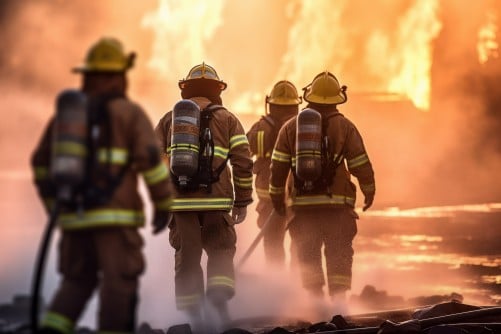A recent groundbreaking study by the American Cancer Society (ACS) has cast a critical new light on the long-term health challenges faced by firefighters worldwide, revealing a significantly increased risk of mortality from several types of cancer. This research underscores the hidden dangers inherent in a profession dedicated to public safety, prompting a reevaluation of protective measures and health screenings for these essential first responders.
With an estimated 15 million firefighters protecting communities across 60 countries, their daily work exposes them to a complex array of hazardous substances. While the specific exposures vary by incident, the consistent presence of known or suspected carcinogens in their operational environments has long been a concern, making comprehensive occupational cancer research paramount.
This new ACS study builds upon previous international findings, including a 2022 review by the International Agency for Research on Cancer (IARC), which concluded there was sufficient evidence linking firefighting occupation to mesothelioma and bladder cancer. However, the IARC review noted limited or inadequate evidence for other cancer types, a gap the new ACS research significantly helps to address.
For this pivotal study, American Cancer Society scientists embarked on an extensive thirty-year follow-up, comparing the mortality risk among over 470,000 firefighters with that of other employed male participants enrolled in the ACS Cancer Prevention Study-II. Data meticulously gathered from surveys of cancer-free individuals in 1982 allowed for a detailed analysis of cancer deaths over 36 years, concluding in 2018.
The results paint a stark picture, indicating that being a firefighter substantially elevates the mortality risk for most cancers, with the strongest associations observed for skin and kidney cancers. Firefighters showed a staggering 58% higher mortality rate for skin cancer and a 40% higher rate for kidney cancer compared to non-firefighters, highlighting specific areas of heightened concern for firefighter health.
Moreover, the study revealed suggestive increases in prostate and colorectal cancer mortality, particularly observed in firefighters with more years on the job. Interestingly, the link to lung cancer mortality only became clear after three decades of follow-up, emphasizing how cancer risk can manifest years after initial carcinogen exposure and underscoring the importance of long-term health monitoring and robust cancer research.
The protracted development period for many cancers underscores the invaluable nature of studies like the ACS Cancer Prevention Study-II, which track participants over decades and meticulously account for other factors such as smoking habits and socioeconomic status. These comprehensive long-term analyses are crucial for accurately discerning occupational cancer risks from confounding variables.
Crucially, the study also calls for renewed attention to the importance of proper personal protective equipment, especially for skin protection, given the elevated rates of fatal skin cancers among the firefighter study population. Enhanced preventative measures and rigorous adherence to safety protocols are vital steps in mitigating these identified occupational hazards.
While the findings may not be favorable, this research serves as a critical spotlight on the profound and long-term health risks firefighters endure beyond the immediate dangers of their profession. It reinforces the urgent need for expanded access to comprehensive cancer screening, early detection programs, and robust cancer prevention strategies for these heroic first responders who are indispensable to our communities.






Leave a Reply